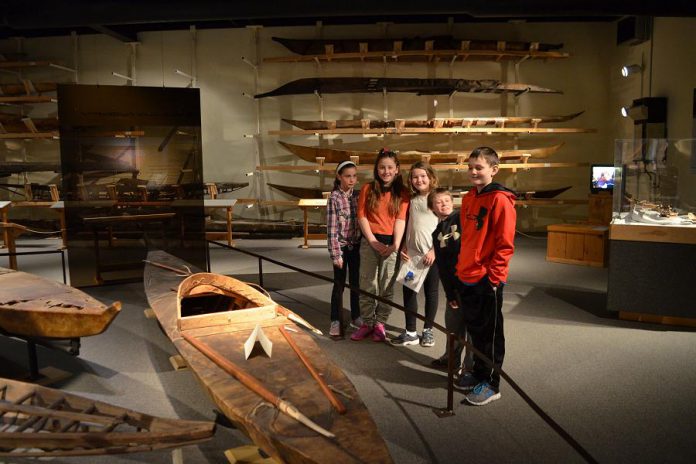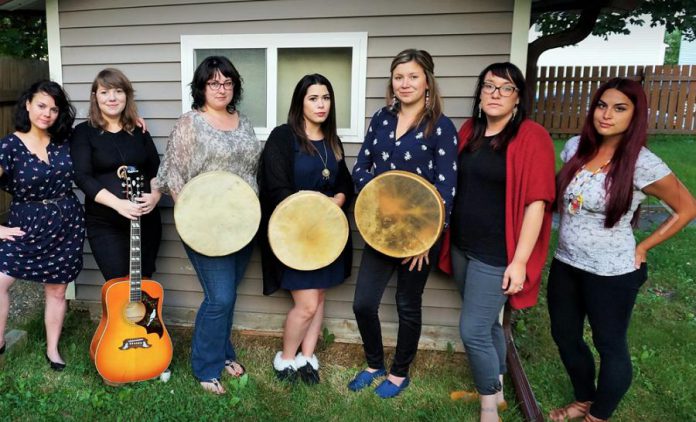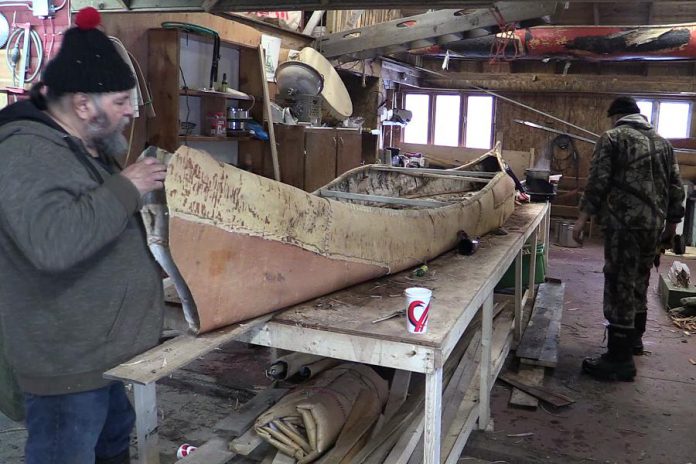
When plans for this year’s National Aboriginal Day at The Canadian Canoe Museum in Peterborough started to unfold, no one expected them to culminate in the kind of celebration that’s about to take place.
On Wednesday, June 21st, Chief Mi’sel Joe and members of the Miawpukek First Nation from Conne River in Newfoundland will present the museum with a 22-foot birch bark canoe — designed specifically to represent the reconciliation of aboriginals with the Canadian government.
The presentation of the gift is part of a free, day-long celebration of National Aboriginal Day, which takes place at The Canadian Canoe Museum (910 Monaghan Rd., Peterborough) and at the Peterborough Lift Lock.
VIDEO: Gwitna’q – Go by Canoe – Miawpukek First Nation
Events during the day include participatory workshops for school groups and the public, with artists and artisans from Miawpukek First Nation, and a ceremonial paddle of the birch bark canoe at the Peterborough Lift Lock (where people can paddle alongside in their own canoe or in the museum’s Voyageur Canoe).
The celebrations then move back to the museum in the early evening for a continuation of the morning’s workshops with Miawpukek singers, drummers, dancers, and canoe builders.
All events and activities are free, and admission to The Canadian Canoe Museum is also free for the entire day. See the full schedule of events below.
Museum general manager Carolyn Hyslop says the gift of the birch bark canoe presents an opportunity to celebrate the relationship the museum enjoys with the people of Miawpukek First Nation.
“We are especially inspired by the work that Chief Mi’sel Joe and the elders in the community are doing to continue the teaching of traditional birch bark canoe building and the teachings that go with it,” she says.
“In the spirit of building relationships and growing the conversation about indigenous relations, we are accepting this canoe into the collection so it can used as an educational tool in our public programs, school programs, and outreach initiatives.”
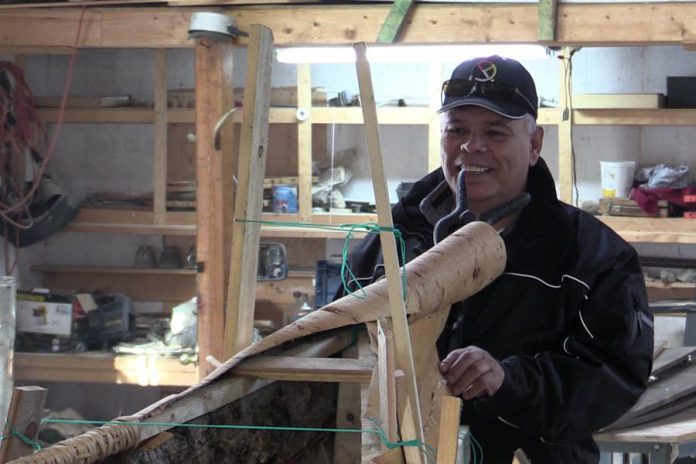
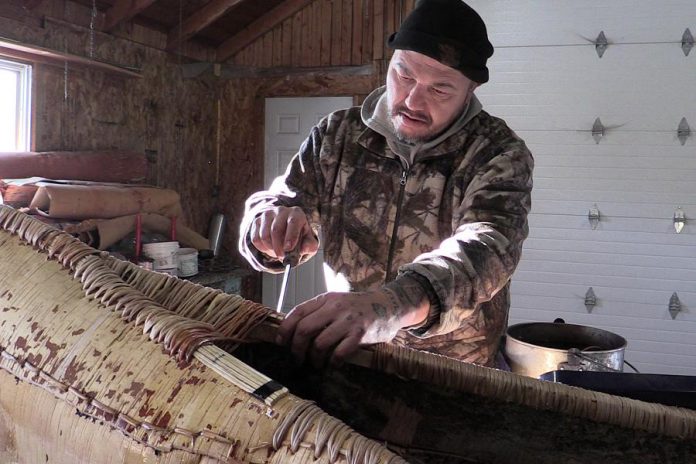
Museum education manager Karen Taylor is inviting teachers to register their students for participatory workshops that will be held June 21 with artists and artisans of the Miawpukek First Nation.
“Many of us have a sense of how birch bark canoes are a part of the contribution of indigenous people to our country,” Taylor says, “but the canoe can also be a portal to so many lessons.
“Every canoe carries a story of its builder and its journeys and it also provides an opportunity to study the science behind the building a canoe, the art, the history, the community and the culture. It’s a way for students to connect with Canadian heritage.”
In the afternoon, the celebrations will move to the water for the ceremonial paddle of the birch bark canoe by the Peterborough Lift Lock. The public is welcome to bring a canoe to paddle alongside, or register for a free spot in the museum’s Voyageur Canoe (space is limited).
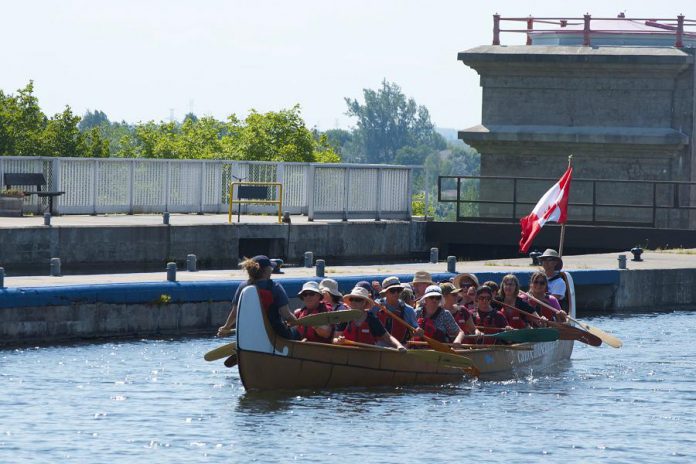
The canoe is built of birch bark and red cedar, along with spruce tree, root and gum, and bear fat — “mainly natural materials gifted to us by Mother Earth,” says Colleen Lambert, Tourism, Culture and Recreation Manager with Miawpukek First Nation.
The birch bark canoe was built over the course of two and a half months by master canoe builder Billy Joe, his son Sylvester Joe, and apprentice canoe-builder Derek Stride.
Lambert says the canoe represents a new beginning, described by the Mi’kmaq word “gwitna’q” (pronounced gwee-de-naahk) which means “go by canoe”.
“We, as aboriginals, will go by canoe to a better place whereby all Canadians, aboriginal and non-aboriginal, are equal,” she explains. “A place where we can work together to provide a better future for all of us here on Mother Earth.”
For more information about the Miawpukek First Nation, visit www.mfngov.ca.
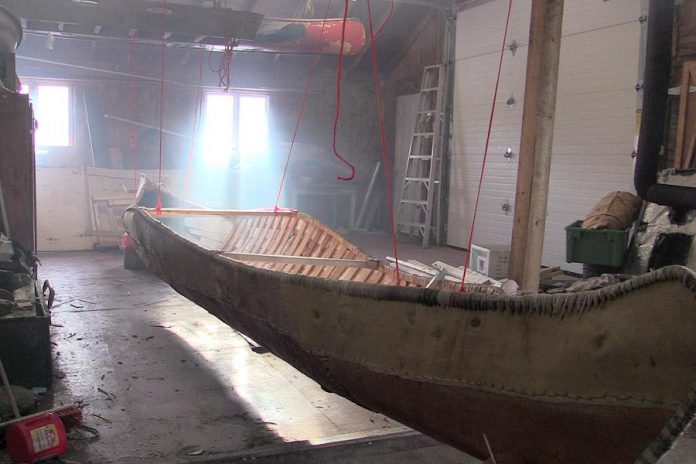
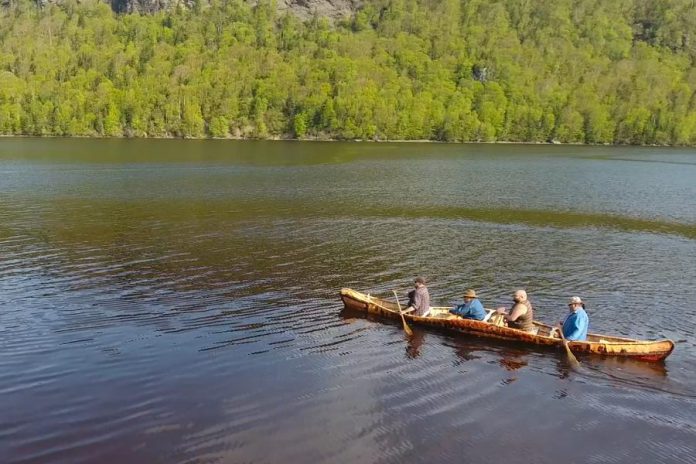
National Aboriginal Day celebrations with Miawpukek First Nation
- 9:30 – 10 a.m. — Opening ceremonies at the museum featuring welcomes from the Ontario President of the Métis Nation Andy Dufrane, Chief Phyllis Williams of Curve Lake First Nation, and Chief Mi’sel Joe of Miawpukek First Nation.
- 10:30 a.m. – 2 p.m. — Participatory workshops and demonstrations through the museum for school groups and the public featuring Eastern Owl (song and dance), Sipuji’j Drummers (drum), master canoe builders (showcasing the birch bark canoe build), and Chief Mi’sel Joe. Groups of 15 students will rotate through four 25-minute participatory workshops/demos with a short lunch break. The workshops will end at 2 p.m. with everyone coming together in a traditional round dance. Limited space is available, please register now by contacting Victoria Veestra at Victoria.Veestra@canoemuseum.ca or 705-748-9153 x218.
- 3:30 – 5 p.m. — Ceremonial paddle of the birch bark canoe at the Peterborough Lift Lock. Members of the public are welcome to bring their own canoe or kayak and gear to the Lift Lock and paddle along. Boats will launch at the Peterborough Lift Lock Visitor Centre and take the last lock up at 3:45 p.m. The paddle will continue towards Tobey’s Bay and then back to the upper reach of the lock (boats will need to be taken out of the water at the upper reach of the Lift Lock, as the lock will be closed at the end of the day). You can also register for a free space in the museum’s Voyageur Canoe (space is limited); email Stacey.Arppe@canoemuseum.ca.
- 6 – 8 p.m. — A continuation of the morning’s workshops at the museum, featuring Miawpukek First Nation singers, drummers, dancers, and canoe builders.
